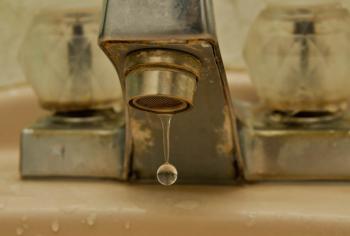Neskantaga First Nation in Ontario has had to boil water since 1995. "We're over 20 years already where our people haven't been able to get the water they need to drink from their taps or to bathe themselves without getting any rashes," Neskantaga Chief Wayne Moonias told CBC News in 2015. Their water issues have yet to be resolved.
They're not alone. In fall last year, 156 drinking water advisories were in place in First Nations in Canada. More than 100 are routinely in effect — some for years or decades. According to a 2015 CBC investigation, "Two-thirds of all First Nation communities in Canada have been under at least one drinking water advisory at some time in the last decade."
Water advisories vary in severity. A "boil water advisory" means residents must boil water before using it for drinking or bathing. "Do not consume" means water is not safe to drink or consume and a "do not use advisory" means water is unsafe for any human use.
Water on First Nations reserves is a federal responsibility, but "severe underfunding" (in the government's own words) for water treatment plants, infrastructure, operations, maintenance and training has led to this deplorable situation. Canada has no federal standards or binding regulations governing First Nations' drinking water.
After years of pressure from First Nations and Indigenous and social justice organizations, the Liberal party promised in its 2015 election campaign to end all First Nations' long-term drinking water advisories within five years of being elected. In 2016, the new government's budget included $1.8 billion over five years, on top of core funding for First Nations' water infrastructure, operations and management. Funds have gone to help Neskantaga and other communities, but money is not enough. If the federal government is to fulfil its commitment to ending advisories in five years, it must reform its system.
The David Suzuki Foundation and Council of Canadians have published a report card rating government’s progress on meeting its commitment in nine First Nations in Ontario, which has the highest number of water advisories in Canada. The "Glass half empty?" report found advisories in three communities have been lifted or will likely be lifted within five years. Efforts are underway in three other communities, but uncertainty lingers about whether they'll succeed within the five-year period. Three others are unlikely to have advisories lifted within five years without reformed processes and procedures. And in one community that had its advisory lifted, new drinking water problems emerged, illustrating the need for sustainable, long-term solutions.
It's unacceptable that so many First Nations lack clean water and face serious water-related health risks -- especially for children and the elderly -- in a country where many people take abundant fresh water for granted. The United Nations recognizes access to clean water and sanitation as human right, and Canada has further obligations under the UN Declaration on the Rights of Indigenous Peoples.
The report card concludes that the system for addressing unsafe drinking water is overly cumbersome and must be streamlined, First Nations must be have more decision-making power to address community-specific drinking water issues, and government must increase transparency around progress and budgetary allocations. It calls on government to redouble its efforts to advance First Nations-led initiatives, fulfil its fiduciary responsibility to First Nations, respect the United Nations Declaration on the Rights of Indigenous Peoples, and ensure the human right to safe and clean drinking water.
The federally funded Safe Water Project is one example of a First Nations–led approach. The Keewaytinook Okimakanak Tribal Council started the initiative in 2014 in response to long-term advisories in four of six member nations. The project keeps management at the community level and includes training and certification of local water operators, operational support while local water operators pursue certification, and remote water quality monitoring technology.
The project's success illustrates the benefits of a local approach. Community-specific, traditional and cultural knowledge are integral to developing lasting solutions. Because the federal government holds the purse strings, it calls most of the shots and often overlooks knowledge held by community members. This needs to change.
Clean drinking water on reserves is not just an Indigenous issue. It's a human right and it should concern all of us.
Written with contributions from David Suzuki Foundation Senior Editor Ian Hanington.
Learn more at www.davidsuzuki.org.
Image: Flickr/Gino Penaloza
Like this article? rabble is reader-supported journalism.




Comments
Do
Don't